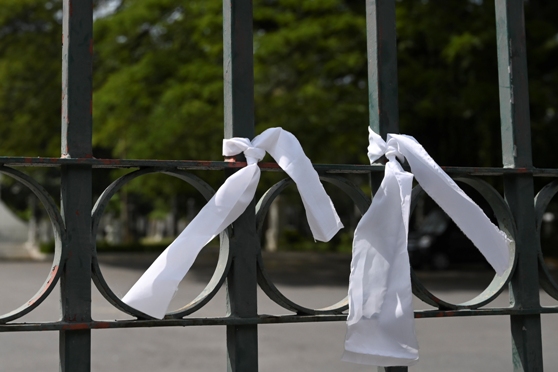Sri Lanka among 25 countries with high religion-related hostilities and restrictions
COLOMBO – Sri Lanka has earned an ignominious place among 25 countries that recorded both ‘high’ or ‘very high’ scores on the Social Hostilities Index (SHI) and Government Restrictions Index (GRI) for 2022, according to a report by the Pew Research Centre.
The ranking, which places Sri Lanka in a challenging category alongside countries such as India, Pakistan, Nigeria, and Syria, highlights significant religion-related hostilities and government-imposed restrictions on religious practices.
The SHI measures religion-related harassment, mob violence, terrorism, militant activity, and conflicts over religious conversions or symbols, with higher scores indicating greater levels of hostility. India topped the list with a score of 9.3 out of 10, the highest among the 198 nations studied. Scores above 7.2 are classified as ‘very high’ Sri Lanka had a score very high score of 7.2 in 2018, 8.0 in 2019, and an improved, but still a high score of 5.6 in 2022
The GRI, on the other hand, assesses laws, policies, and actions that regulate or limit religious beliefs and practices, including bans on specific beliefs, unequal benefits for religious groups, and mandatory registration requirements. Scores above 6.6 are classified as ‘very high’. Sri Lanka had a moderate ranking of 4.2 in 2018, a high of 6.0 in 2019 and 6.1 in 2022, placing it among nations that face the dual burden of elevated societal hostilities and restrictive government policies.
Sri Lanka’s inclusion among nations with ‘high’ or ‘very high’ SHI and GRI scores underscores the growing challenges in fostering religious harmony.
The Pew report records 59 of the 198 countries (30%) had ‘high’ or ‘very high’ GRI scores in 2022, up from 20% in 2007 and 45 countries (23%) recorded ‘high’ or ‘very high’ SHI scores in 2022, slightly up from 43 in 2021.
Harassment by governments, one of the most prevalent forms of restriction, was reported in 186 of 198 nations (94%) in 2022. Government interference in worship, such as withholding permission to worship or restricting religious practices, was also widespread, affecting 170 countries (86%). These restrictions disrupt religious activities, from access to places of worship to rituals like burial practices.
Only 12% (25 countries) had ‘high’ or ‘very high’ GRI scores and SHI scores in 2022: India, Nigeria, Syria, Pakistan, Iraq, Egypt, Afghanistan, Israel, Libya, Palestinian territories, Ukraine, Bangladesh, France, Jordan, Iran, Sri Lanka, Somalia, Tunisia, Indonesia, Yemen, Laos, Nepal, Algeria, Maldives, and Armenia. In about 62% of the countries, including Canada and South Korea, the GRI and SHI scores were ‘low’ or ‘moderate’. In 16% of the countries, the GRI was ‘very high’ or ‘high’, but the SHI was ‘low’ or ‘moderate’; these include Cuba and China. In 10% of countries, the GRI was ‘low’ or ‘moderate’, but the SHI was ‘high’ or ‘very high’. These include Brazil and the Philippines.
-ENCL



Comments are closed, but trackbacks and pingbacks are open.